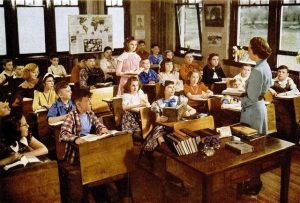2 What is the Purpose of School?
Jennifer Beasley and Myra Haulmark
What is the Purpose of School?
What is the purpose of school? Neil Postman said that “without a purpose, schools are houses of detention, not attention” (1995, p. 7). Most countries have systems of formal education and many of these are compulsory. Although the names of schools differ, most include a primary school for young children and a secondary school for teenagers (Roser & Oritz-Ospina, 2019).
Objectives and Key Terms
In this chapter, readers will…
- Understand the basic purposes of school
- Describe several different understandings of the concept of “school”
- Define the nature of school for each level: elementary, middle, and high schools
Key terms in the chapter are…
-
- Compulsory
- Formal Education
- Informal Education
- Vocational
Defining School
Before landing upon a definition for school, it is important to delineate the differences between education and schooling.
Education is a process of learning and growing as one gains understanding about the surrounding world. This is a lifelong process. It is, as John Dewey (1916) put it, a social process – ‘a process of living and not a preparation for future living.’
Schooling can often look like an institution with a very specific motive – drill learning into people according to some plan often drawn up by others. Paulo Friere (1973) famously called this banking – making deposits of knowledge. This type of “schooling” treats learners like objects.
Interested in learning more about this? https://www.gse.harvard.edu/news/ed/15/01/whats-worth-learning-school
What do you think?

Schooling vs. Education Sort
Sort the following phrases into the category where it best fits:
| Schooling | Education |
|
|
Choices: Rigid, Structured; Facts, information to be absorbed; Life experiences; Personal, individual interests; Stops and starts, finite; May is not all that is learned; Always going on; Can exist without schooling; Can exist without education
School Culture
What makes a good school culture? Shafer (2018) noted that it is all about connections. She describes five interwoven elements that support school structure, 1) Fundamental beliefs, 2) Shared values, 3) Norms (how people believe they should act), 4) Patterns and behaviors, and 5) Tangible evidence. To read more about those elements, you can find the article here: https://www.gse.harvard.edu/news/uk/18/07/what-makes-good-school-culture
– Leah Shafer
Purposes of School
Is School for Knowledge?
If asked, most people would say that the purpose of school is to provide knowledge, but the question becomes what knowledge and who should decide. Is learning for the sake of learning what school is about? Learning expands the mind and school is a way for students to be exposed to different ideas and concepts. Knowledge obtained through school can provide students with a sense of personal fulfillment (Education).
“It seems to me, that education has a two-fold function to perform in the life of man and in society: the one is utility and the other is culture. Education must enable a man to become more efficient, to achieve with increasing facility the legitimate goals of his life.”
–Martin Luther King Jr (1947)
It is argued that anything learned in school could be learned on your own (Gatto, 2005). In the modern-day of the Internet and with vast libraries of knowledge available to us, this is very true. There then becomes a problem of motivation. What would make someone want to learn math or science? Does a child just decide someday that they want to learn all about Chemistry? (Postman, 1995) It is not an issue of what information is necessary, but an issue of exposing students to different ideas that they can choose to grow and build on. It is teaching them how to learn. Education should expose students to information and teach them how to think, not tell them what to think. Martin Luther King Jr said, “Education must enable one to sift and weigh evidence, to discern the true from the false, the real from the unreal, and the facts from the fiction” (1947).
Is School for Getting a Job?
Not everyone has the opportunities or wants to go to college. Therefore, the purpose of school must be to give students the skills to get a job. This means that education is a way for anyone to support him or herself and economically contribute to society (Education). Some of these skills are taught in many of the basic classes: reading, writing, and arithmetic. There is also vocational education, which is extremely important to the lives of students who do not enjoy academia. Just because a student does not like school does not mean that the school should ignore them. It is the school’s responsibility to educate all students and prepare them for their future.
Is School for Socialization?
It is argued that any of the above items can be learned on your own (Gatto, 2005). As stated earlier, the issue of motivation and outside circumstances does provide a problem with this theory, but what can replace the socialization that a student receives in school?
Einstein said that the school’s responsibility is to educate the individual as a free individual but to also educate them to be part of society (Haselhurst, 2007). Students are around hundreds of people their own age and this teaches them how to act in society and how to communicate. This is helpful no matter what they do with their future and nothing can replace those skills. Being in a school with that many people also exposes the student to people who are different from him or herself and this is extremely helpful in anyone’s development as a human being and a better member of society (Postman, 1995). Professor Nel Noddings said that the school’s aim is “to produce competent, caring, loving, and lovable people” (Kohn, 2004, p.2).
Types of Schools
In most states, the school year is 180 days. School days often last a total of six and a half hours. This means that a child may spend more than 1,000 hours in school each year. In elementary school, how are these hours typically spent? In these sections, we will discuss the teacher’s role, what students experience in elementary, middle school, and high school.
Elementary
An elementary school is the main point of delivery of primary education for children between 5-11. In elementary school, children are exposed to a broad range of topics and often remain together in one classroom. School districts and the state determine the curriculum, but generally, a student learns basic arithmetic, English proficiency, social studies, science, physical development, and fine arts.
The Role of the Teacher
An elementary school teacher is trained with an emphasis on human cognitive and psychological development as well as the principles of curriculum development and instruction. Teachers earn either a Bachelors or Master’s degree in Early Childhood or Elementary Education.
The public elementary teacher typically instructs between twenty and thirty students of diverse learning needs. These teachers use a variety of ways to teach, with a focus on student engagement (getting a student’s attention).
What Students Experience
Originally, an elementary school was synonymous with primary education. Many students prior to World War I did not attend school past Grade 8. Over the past few decades, schools in the USA have seen numbers of high school graduates rise and with it, changes in what students experience in school.
An elementary school typically contained one-teacher, one-class models, but this has been changing over time. Multi-age programs, where children in different grades share the same classroom and teachers. Another alternative is that children might have a main class and go to another teacher’s room for one subject. This could be called a rotation and it is similar to the concept of teams found in junior high school.
Middle School
Watch the following video from the perspective of a middle schooler. What would you point out as part of her environment at school? Is there any evidence of her relationship with what she is learning or her relationship with educators at her school?
High School
While there is no set standard for an American high school, some generalizations can be made about the majority. Schools are managed by local, elected school districts. Students ages 14-18 participate in four years of school. School years are normally around nine months and are broken up into quarters or semesters. The High School curriculum is defined in terms of Carnegie Units, which approximate 120 class contact hours within a year. No two schools will be the same, and no two students will have the same classes. There are some general core subjects, but electives will vary by school.
Activity:
Fill out the following to highlight was is important in each level: https://docs.google.com/document/d/1gAAwwsThkvlVNHrYcII_2m5PByo8ggC4JQe6QJy4dYw/edit?usp=sharing
Thoughts
Watch the following video with this question in mind: According to this author, what do effective schools do differently? Does this align more closely with the notion of “schooling” or “education”?
Dig Deeper
The following resources are provided when “digging deeper” into the chapter:
Roser, Max; Ortiz-Ospina, Esteban (2019). “Primary and Secondary Education”. Our World in Data. Retrieved 24 October 2019.
Freire, P. (1972). Pedagogy of the Oppressed. Harmondsworth: Penguin.
Shafer, L. (2018) https://www.gse.harvard.edu/news/uk/18/07/what-makes-good-school-culture
Postman, Neil. (1995). The End of Education. New York: Vintage Books.
Education. (n.d.). Retrieved September 16, 2007 from http://en.wikipedia.org/wiki/Education
Gatto, John Taylor. (2005) Dumbing us Down: The Hidden Curriculum of Compulsory Schooling. (Rev. ed.). Canada: New Society Publishers.
Haselhurst, Geoff. (2007) Philosophy of Education. Retrieved September 19, 2007 from http://www.spaceandmotion.com/Philosophy-Education.htm
Hirsch, E.D. Jr. (2006). The Knowledge Deficit. Boston: Houghton Mifflin Company.
King, Martin Luther Jr. (1947). The Purpose of Education. Retrieved September 19, 2007 from http://www.drmartinlutherkingjr.com/thepurposeofeducation.htm
Kohn, Alfie. (2004). What Does it Mean to Be Well Educated? Boston: Beacon Press.
Modified from:


